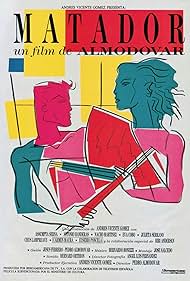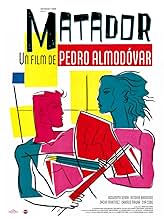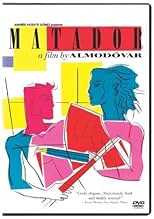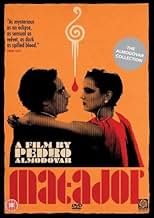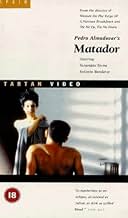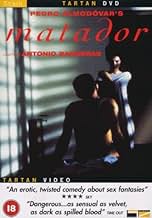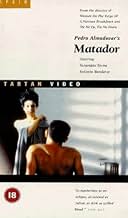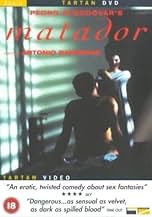A matador is wounded by a bull and can no longer kill in the arena. It is just one of the problems of one of the characters that unexpectedly collide in this film.A matador is wounded by a bull and can no longer kill in the arena. It is just one of the problems of one of the characters that unexpectedly collide in this film.A matador is wounded by a bull and can no longer kill in the arena. It is just one of the problems of one of the characters that unexpectedly collide in this film.
- Awards
- 6 wins & 6 nominations total
Nacho Martínez
- Diego
- (as Nacho Martinez)
Bibiana Fernández
- Vendedora Flores
- (as Bibi Andersen)
Verónica Forqué
- Periodista
- (as Veronica Forque)
Mercedes Jiménez
- Alumna 3ª
- (as Mercedes Jimenez)
Francesca Prandi
- Alumna 4ª
- (as Francesca Romana)
Featured reviews
It is very much worth watching this early film of Almodovar from 1986, with a painfully young Antonio Banderas also at one of his first major screen presences. As many of his latest great movies it's a film hard to put in a precise square, a combination of comedy and tragedy, of crime, love and corrida movie with a touch of absurd and a touch of passion taken directly from life.
Although many of the major themes of passion, sexual desire and ambiguity, relation between love and death are already present the movie is somehow simpler in action and easier to watch than some of the later films. The story of two sexual predators and murderers, united in life by the passion for bull fights and in death by their passion for each other is acted with accuracy by a good team of actors and directed with an already recognizable style by Almodovar. The hand of the young master is certainly already there, and the film ages well 20 years after is premiere.
Although many of the major themes of passion, sexual desire and ambiguity, relation between love and death are already present the movie is somehow simpler in action and easier to watch than some of the later films. The story of two sexual predators and murderers, united in life by the passion for bull fights and in death by their passion for each other is acted with accuracy by a good team of actors and directed with an already recognizable style by Almodovar. The hand of the young master is certainly already there, and the film ages well 20 years after is premiere.
Matador is one of the strangest, darkest, (and yet compelling) early films from Spanish master filmmaker Pedro Amoldovar.
It is completely nuts.
Pour in equal measures of sadism, masochism, bullfighting, perverted sexuality, and sexual violence. Add in a splash of comedy and soupcon of star-crossed lovers (if, for a moment, you thought pairing Tybalt and Lady McBeth qualified as star-crossed) and you have what passes as characterisation. Mix dark nights with gaudy flamenco colours and you have some striking cinematography. I'll come to the plot in a minute
Amoldovar was clearly enjoying Spanish cinema's new-found, post-Franco sexual and artistic liberalism. The prudish among his audience might suggest he was positively wallowing in it. Whatever the truth, Matador is a masterpiece of his style, if not, indeed, a whole style in of itself.
The plot or possibly a better description, the tapestry over which the characters move is a murder hunt. Very few prizes will be won, however, for guessing the culprit/s. Two people are quickly in the audience's frame because they are shown er murdering people on camera. A third person (Banderas, in to my mind his best Amoldovar role) confesses to the murders in a fit of insecurity and remorse over an attempted rape ("some girls get all the luck" comments a female duty officer dryly, proving that feminism wasn't that big in Spain back in the 1980s). Nevertheless, the net soon closes on the crushingly obvious culprits (who in the meantime have developed quite a crush on each other). As previously mentioned, completely nuts.
Matador's strengths are in its characterisation and its sheer bare-facedness. Amoldovar has, as usual, assembled a character list of freaks and proceeded to humanise all of them to the point where there is a genuine whiff of tragedy in the final act. To mention the great performances is really to rehearse the cast list. Assumpta Serna, Nacho Martinez, Antonio Banderas and Eva Cobo are all excellent. And it really is worth seeing, just for the young Antonio.
There are some interesting points made in the film about outsiders, liberalism, sexual politics and gender politics (as always with Amoldovar). I'll let you pick through them. It is, though, not so much a film as a giant red rag to the raging bull of conservatism, deftly whisked aside to the ragged applause of an admiring, if somewhat perplexed, audience. A positive Jimi Hendrix of a film, unpolished, with some definite dud notes, but undeniably the work of a genius. 8½/ 10
It is completely nuts.
Pour in equal measures of sadism, masochism, bullfighting, perverted sexuality, and sexual violence. Add in a splash of comedy and soupcon of star-crossed lovers (if, for a moment, you thought pairing Tybalt and Lady McBeth qualified as star-crossed) and you have what passes as characterisation. Mix dark nights with gaudy flamenco colours and you have some striking cinematography. I'll come to the plot in a minute
Amoldovar was clearly enjoying Spanish cinema's new-found, post-Franco sexual and artistic liberalism. The prudish among his audience might suggest he was positively wallowing in it. Whatever the truth, Matador is a masterpiece of his style, if not, indeed, a whole style in of itself.
The plot or possibly a better description, the tapestry over which the characters move is a murder hunt. Very few prizes will be won, however, for guessing the culprit/s. Two people are quickly in the audience's frame because they are shown er murdering people on camera. A third person (Banderas, in to my mind his best Amoldovar role) confesses to the murders in a fit of insecurity and remorse over an attempted rape ("some girls get all the luck" comments a female duty officer dryly, proving that feminism wasn't that big in Spain back in the 1980s). Nevertheless, the net soon closes on the crushingly obvious culprits (who in the meantime have developed quite a crush on each other). As previously mentioned, completely nuts.
Matador's strengths are in its characterisation and its sheer bare-facedness. Amoldovar has, as usual, assembled a character list of freaks and proceeded to humanise all of them to the point where there is a genuine whiff of tragedy in the final act. To mention the great performances is really to rehearse the cast list. Assumpta Serna, Nacho Martinez, Antonio Banderas and Eva Cobo are all excellent. And it really is worth seeing, just for the young Antonio.
There are some interesting points made in the film about outsiders, liberalism, sexual politics and gender politics (as always with Amoldovar). I'll let you pick through them. It is, though, not so much a film as a giant red rag to the raging bull of conservatism, deftly whisked aside to the ragged applause of an admiring, if somewhat perplexed, audience. A positive Jimi Hendrix of a film, unpolished, with some definite dud notes, but undeniably the work of a genius. 8½/ 10
If you're a fan of Pedro Almodovar, you'll love this one from 1986.. filmed in Madrid, it has all the usual elements: offbeat characters who meet up and get even crazier, like atoms smashing together. when a young matador Angel (Antonio Banderas at 26) thinks his heroes have committed crimes, he confesses to them to take the fall. watch that opening scene.. .pretty rough stuff: (simulated) sex, nudity, and murder, all in one. his lawyer has her own kinky issues, and wants to defend Angel. Look for the usual Almodovar cast, with Carmen Maura and Chus Lampreave. Assumpta Serna is the sexy, flirty, over-sexed Maria. and the gory bullfights, which play a big part in the story. Secrets. everyone has their secret. which ones will come out? Liaisons... more secrets. will the police find the real killer(s)? it's very good. intrigue.
Essentially seen by many as a warped sex fantasy that uses the codes and conventions of the detective thriller to disguise a darker, more psychological film about the wayward perversions and sinister desires of a seemingly affluent area of contemporary Madrid; Matador (1986) can also be seen as a not-so-subtle comment on the nature of modern-day relationships, aspirations and obsessions in a meta-textual form that makes continual use of its titular, bullfighting motif. Although it does have some slight thematic problems, particularly in terms of the overall tone of the film and eventual motivation of the characters, it is, nonetheless, one of Almodóvar's most interesting and perplexing films of this particular period; featuring a refinement of many of his earliest interests and characteristics from films like Dark Habits (1983) and What Have I Done to Deserve This? (1984), as well as being the film that signalled the move into the second phase of his career.
As the implications of the title would suggest, the film's narrative is bolstered by numerous references, both spoken and visual, to the obvious role-play and iconography of the bullfight. It is also a film about violence, and the sexuality of violence; an uncomfortable idea that is reinforced by the film's provocative opening sequence, in which we find the central matador of the title, Diego Montes, masturbating to violent scenes of exploitation cinema. The scene establishes the nature of the matador, both as a character and as a social phenomenon, as well as introducing the link between sex and death that will come to form an important thematic strand to the narrative. As the story progresses, the mechanisms of the drama conspire to throw together two separate characters that come to complement the unspoken desires and murderous lust that they seemingly share with one another, with the eventual courtship and inevitable seduction presented by the director as a surrogate bullfight in its self.
Where the film falls apart slightly is in the presentation of the character played by Antonio Banderas, a hyper-sensitive, implied homosexual who idolises the matador to the extent that he actually attempts to rape his young, fashion-model girlfriend (an act that eventually leads him to confess to a string of serial killings as a result of his mother's enforced, catholic guilt). It is a complex character, impeccably performed by the young Banderas, but his appearance ultimately sends the film off on a tangent that detracts from the central crux of the drama. Though the inclusion of this subplot does allow Almodóvar the chance to make a satirical comment on the nature of everything from fashion, to religion, sexuality, etc, these themes often feel like they've been handpicked from a completely different film, not always complimenting the central story, and too often leading it in directions that in the end feel unfinished or slightly unformed. Many of these loose ends can be glossed over, while some (the last minute implication of "second sight" as suggested by a solar eclipse) really seem to come out of leftfield.
Nevertheless, these are minor criticisms that don't necessarily destroy the ultimate intentions of the film - which really only become clear in the final scene - or the fantastic direction of Almodóvar and the performances of his cast. Although Matador certainly has its flaws (not to mention its detractors), it is, in my opinion, a fine little film and one of Almodóvar's most original and audacious creations. The performances are all incredibly committed, including the central pairing of Assumpta Serna and the late Nacho Martínez, as well the fine support from Banderas, the gorgeous Eva Cobo and Almodóvar regulars Carman Maura and Eusebio Poncela; whilst the central idea behind the script and the bold stokes of the director's intuitive grasp of the various film-making processes further refines and develops a number of themes that have come to be at the forefront of Almodóvar's career for the last twenty-five years.
As the implications of the title would suggest, the film's narrative is bolstered by numerous references, both spoken and visual, to the obvious role-play and iconography of the bullfight. It is also a film about violence, and the sexuality of violence; an uncomfortable idea that is reinforced by the film's provocative opening sequence, in which we find the central matador of the title, Diego Montes, masturbating to violent scenes of exploitation cinema. The scene establishes the nature of the matador, both as a character and as a social phenomenon, as well as introducing the link between sex and death that will come to form an important thematic strand to the narrative. As the story progresses, the mechanisms of the drama conspire to throw together two separate characters that come to complement the unspoken desires and murderous lust that they seemingly share with one another, with the eventual courtship and inevitable seduction presented by the director as a surrogate bullfight in its self.
Where the film falls apart slightly is in the presentation of the character played by Antonio Banderas, a hyper-sensitive, implied homosexual who idolises the matador to the extent that he actually attempts to rape his young, fashion-model girlfriend (an act that eventually leads him to confess to a string of serial killings as a result of his mother's enforced, catholic guilt). It is a complex character, impeccably performed by the young Banderas, but his appearance ultimately sends the film off on a tangent that detracts from the central crux of the drama. Though the inclusion of this subplot does allow Almodóvar the chance to make a satirical comment on the nature of everything from fashion, to religion, sexuality, etc, these themes often feel like they've been handpicked from a completely different film, not always complimenting the central story, and too often leading it in directions that in the end feel unfinished or slightly unformed. Many of these loose ends can be glossed over, while some (the last minute implication of "second sight" as suggested by a solar eclipse) really seem to come out of leftfield.
Nevertheless, these are minor criticisms that don't necessarily destroy the ultimate intentions of the film - which really only become clear in the final scene - or the fantastic direction of Almodóvar and the performances of his cast. Although Matador certainly has its flaws (not to mention its detractors), it is, in my opinion, a fine little film and one of Almodóvar's most original and audacious creations. The performances are all incredibly committed, including the central pairing of Assumpta Serna and the late Nacho Martínez, as well the fine support from Banderas, the gorgeous Eva Cobo and Almodóvar regulars Carman Maura and Eusebio Poncela; whilst the central idea behind the script and the bold stokes of the director's intuitive grasp of the various film-making processes further refines and develops a number of themes that have come to be at the forefront of Almodóvar's career for the last twenty-five years.
The connection between sex and death is not a novel one. Elizabethan poetry would occasionally use the latter as a metaphor for the former. Pedro Almodóvar's sixth feature is about three people who have erased the line between the two: Nacho Martinez, a matador gored in the ring, who now teaches students on the art; Antonio Banderas, one of his pupils; and Assumpta Serna, a lawyer defending Banderas who is charged with raping and killing two girls.
In other words, it's one of Almodóvar's movies about the weird kinks of the world. This time, however, he is not concerned with the people at the edge of Spanish society, but at the center of the normal world... assuming there is such a thing. We are all weird, we all act outside the norms, and the people we respect can be the most bizarre.
It's rather slow-moving for one of his movies, probably because this is not one of his shock comedies - although there are comic elements. Visually, it is sumptuous, with a focus on colors, particularly bright reds that draw one's eyes. Miss Serna is a sharp dresser, and she wears a cape in several scenes, which she whirls like a bullfighter going in for the kill.
Is Almodóvar decrying bullfighting? Or in favor of consensual activity of whatever sort? Has he simply presented his bizarre story, and left his audience to draw the moral conclusions it chooses? Or is this simply the sort of story he likes to tell? I think the last is true, but there's nothing simple about it.
In other words, it's one of Almodóvar's movies about the weird kinks of the world. This time, however, he is not concerned with the people at the edge of Spanish society, but at the center of the normal world... assuming there is such a thing. We are all weird, we all act outside the norms, and the people we respect can be the most bizarre.
It's rather slow-moving for one of his movies, probably because this is not one of his shock comedies - although there are comic elements. Visually, it is sumptuous, with a focus on colors, particularly bright reds that draw one's eyes. Miss Serna is a sharp dresser, and she wears a cape in several scenes, which she whirls like a bullfighter going in for the kill.
Is Almodóvar decrying bullfighting? Or in favor of consensual activity of whatever sort? Has he simply presented his bizarre story, and left his audience to draw the moral conclusions it chooses? Or is this simply the sort of story he likes to tell? I think the last is true, but there's nothing simple about it.
Storyline
Did you know
- TriviaThe film that Maria and Diego stand watching at the cinema is King Vidor's Duel in the Sun (1946), an equal lurid tale of wayward passion.
- Quotes
Francisco Montesinos: I've told you not to shoot up in the dressing rooms!
- ConnectionsFeatured in Playboy: The Story of X (1998)
- How long is Matador?Powered by Alexa
Details
- Release date
- Country of origin
- Official sites
- Language
- Also known as
- 鬥牛士
- Filming locations
- Viaducto de Segovia, Madrid, Spain(Bridge where Maria and Diego talk.)
- Production companies
- See more company credits at IMDbPro
Box office
- Gross US & Canada
- $279,394
- Opening weekend US & Canada
- $13,399
- Aug 13, 2006
- Gross worldwide
- $286,126
Contribute to this page
Suggest an edit or add missing content

